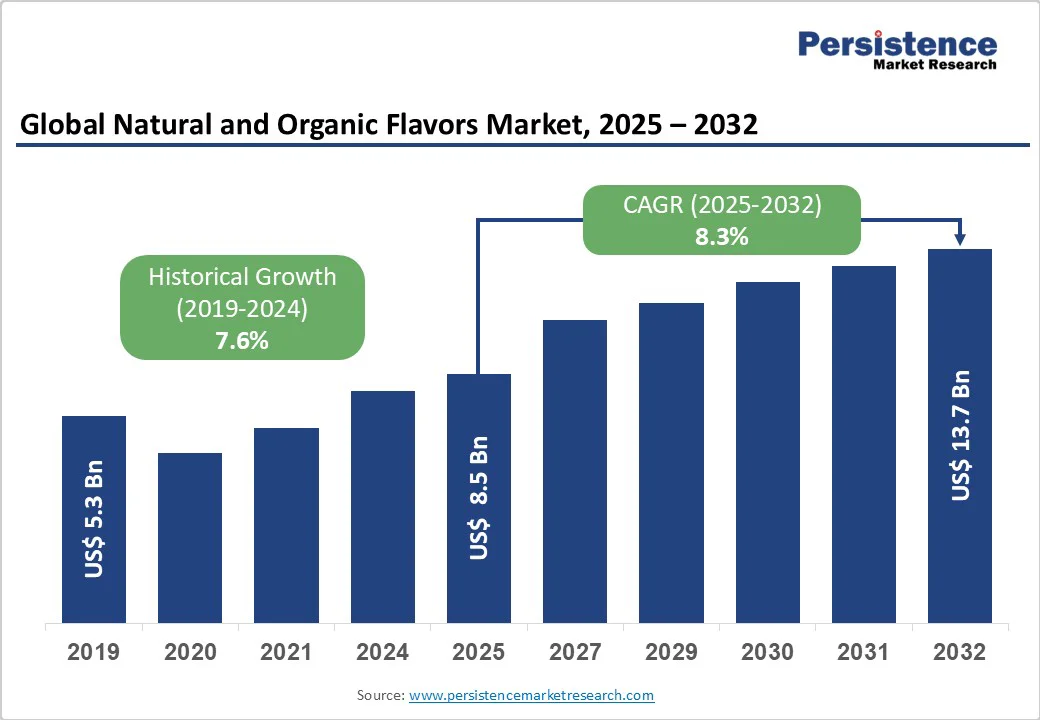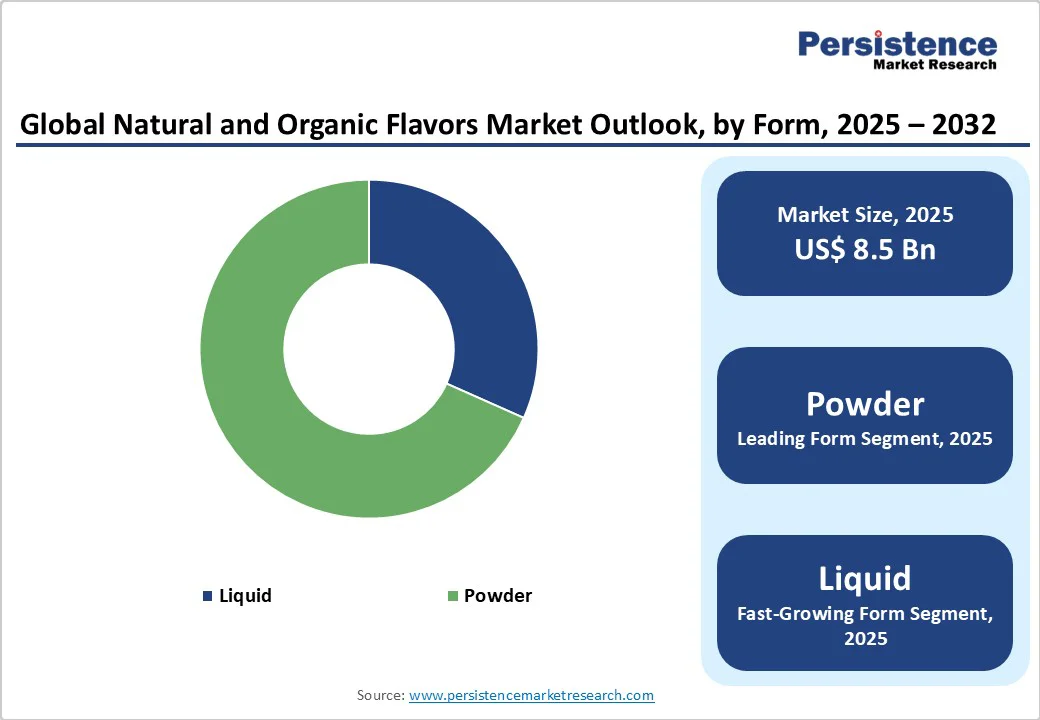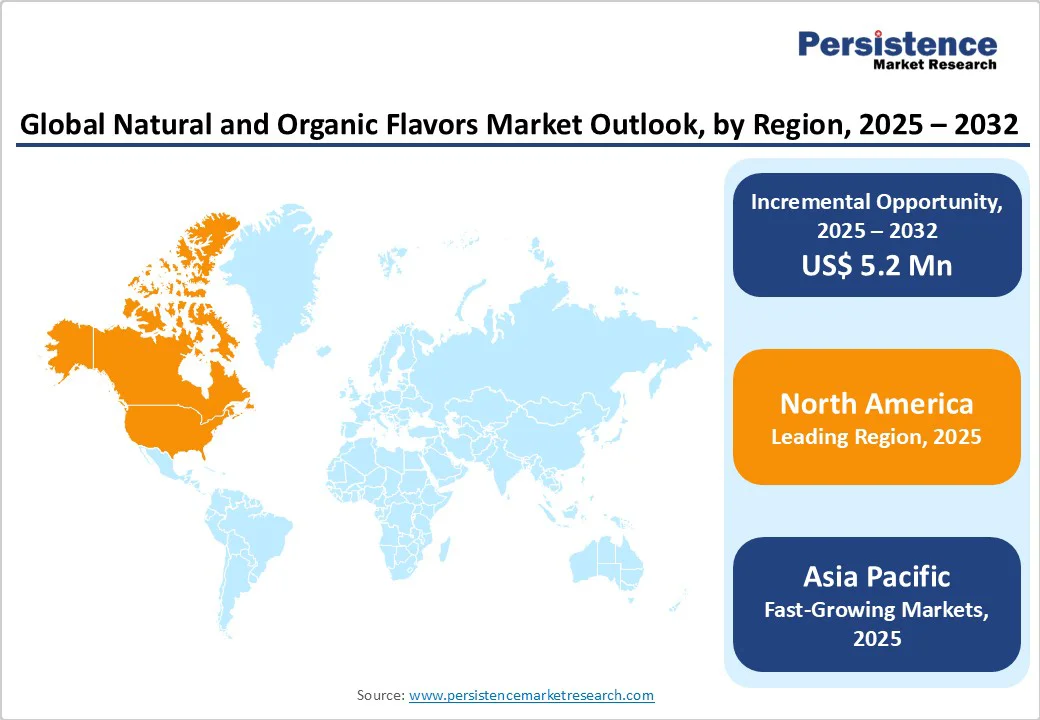ID: PMRREP11836| 190 Pages | 7 Oct 2025 | Format: PDF, Excel, PPT* | Food and Beverages

The global natural and organic flavors market size is likely to value at US$ 8.5 Billion in 2025 to reach US$ 13.7 Billion by 2032, growing at a CAGR of 8.3% during the forecast period from 2025 to 2032. Natural flavors are derived from plant, animal, or microbial sources through physical processes like distillation or extraction, while organic flavors adhere to stringent certification standards, ensuring no synthetic pesticides or GMOs are involved. These flavors enhance taste profiles in diverse applications, including beverages, confectionery, dairy, bakery, and savory snacks.
| Key Insights | Details |
|---|---|
|
Natural and Organic Flavors Market Size (2025E) |
US$ 8.5 Bn |
|
Market Value Forecast (2032F) |
US$ 13.7 Bn |
|
Projected Growth (CAGR 2025 to 2032) |
8.3% |
|
Historical Market Growth (CAGR 2019 to 2024) |
7.6% |

The global natural and organic flavors market is driven significantly by the rising consumer preference for clean-label and health-focused products. Increasing awareness of diet-related health issues, coupled with growing concerns over artificial additives and preservatives, has led consumers to actively seek products made from natural and organic ingredients. Millennials and Gen Z, who are shaping modern purchasing trends, show a strong inclination toward products that are transparent, minimally processed, and perceived as healthier.
Retailers and manufacturers have responded by highlighting ingredient transparency in packaging and offering natural alternatives, which has further boosted consumer confidence. Additionally, the growth of online grocery platforms has made natural and organic products more accessible, encouraging higher adoption rates. Social trends, including healthy eating and plant-based diets, have normalized the use of natural flavors across beverages, snacks, and packaged foods. This shift toward clean-label consumption not only drives volume growth but also motivates innovation, with companies developing new flavor formulations that meet the dual demand for taste and health, thereby sustaining the market’s robust expansion.
The natural and organic flavors market faces a significant restraint in the form of high production costs. Sourcing raw materials from fruits, vegetables, plants, dairy, and seafood involves labor-intensive harvesting, seasonal dependency, and often limited availability, which elevates input costs. Processing natural ingredients into stable, high-quality flavors requires sophisticated techniques such as steam distillation, cold pressing, and enzymatic extraction, which are more expensive than conventional synthetic methods. These expenses are often reflected in retail pricing, making natural and organic flavor products less accessible to price-sensitive consumers, particularly in emerging markets.
Smaller food and beverage manufacturers may struggle to absorb these costs, limiting their ability to compete with larger, established brands. In addition, maintaining product consistency and quality across batches adds additional operational complexity. Collectively, these factors restrict market penetration and adoption, posing a challenge to the widespread expansion of natural and organic flavor offerings globally.
Technological advancements in flavor extraction present a substantial growth opportunity for the natural and organic flavors market. Modern extraction techniques, including supercritical CO2 extraction, vacuum distillation, enzymatic methods, and membrane filtration, allow manufacturers to produce high-purity natural flavors more efficiently while retaining the nutritional and aromatic qualities of raw ingredients. These innovations reduce production time, improve yield, and minimize waste, significantly lowering overall costs and making natural flavors more commercially viable.
Enhanced extraction methods enable the development of novel flavors, including rare botanical and plant-based compounds, broadening the product portfolio and catering to evolving consumer tastes. With the growing demand for clean-label, plant-based, and functional food products, companies can leverage these technologies to offer differentiated, high-quality flavor solutions. By investing in research and advanced processing infrastructure, manufacturers can expand market reach, penetrate new regions, and respond swiftly to changing consumer preferences, thereby driving sustained growth and competitiveness in the market.
By form, powder forms are the dominant product type, capturing over 67% of the market share in 2025. Powdered flavors are preferred for their excellent stability, long shelf life, and ease of storage, making them ideal for incorporation into dry food applications such as bakery mixes, seasoning blends, and snack powders. Their uniform dispersion ensures consistent flavor delivery, which is particularly important in large-scale food production. Manufacturers also favor powdered formats for logistical efficiency, as they reduce transportation costs and simplify handling compared with liquid forms.
On the other hand, liquid flavors are the fastest-growing segment, driven by increasing consumer demand in beverages, sauces, and liquid-based food products. Liquid formats provide superior solubility, immediate flavor release, and a fresh taste profile, making them particularly suitable for ready-to-drink beverages, syrups, and dairy-based products. This rising adoption positions liquid flavors as a rapidly expanding opportunity within the natural and organic flavors market.
In the natural and organic flavors market, the fruit and fruit juices segment holds approximately 35% share. This segment is highly favored due to its ability to deliver vibrant, natural sweetness and authentic fruit notes that enhance the taste of beverages, yogurts, confectionery, and desserts. Fruit-derived flavors are versatile and widely accepted by consumers, making them a preferred choice for manufacturers aiming to create appealing and health-conscious products. The consistent availability of fruits and the development of advanced extraction methods further support the dominance of this segment.
The fastest-growing source is plants and botanical extracts. Driven by the rising interest in herbal, functional, and plant-based products, this segment is expanding rapidly. Botanical flavors offer unique, nuanced taste profiles and health benefits, making them increasingly popular in beverages, supplements, and ready-to-eat meals, positioning them as a key growth opportunity.

North America leads the global natural and organic flavors market, driven by increasing consumer demand for clean-label and health-conscious products. The U.S. and Canada are at the forefront, with a growing preference for natural ingredients in food and beverages. Regulatory support, such as the USMCA, facilitates the trade of organic products within the region. Companies are focusing on innovation and sustainability to meet consumer expectations. The market is characterized by a shift towards plant-based and functional flavors, catering to the rising trend of health and wellness. Despite challenges like tariff uncertainties, the region's robust infrastructure and consumer base continue to drive market growth. The natural and organic flavors market in North America is projected to expand steadily, reflecting the region's dominance in the global market.
The European natural and organic flavors market is witnessing steady growth, driven by increasing consumer preference for healthier and clean-label products. Germany dominates the region due to its mature food and beverage industry, strong regulatory framework, and widespread adoption of natural ingredients. France and the UK are key contributors, focusing on innovation and sustainable sourcing of flavors. Spain and Italy are emerging as the fastest-growing markets, fueled by rising demand for plant-based and functional flavors in bakery, confectionery, and beverages.
Manufacturers are increasingly introducing liquid and powder natural flavors to cater to diverse applications and convenience in food processing. The growth is further supported by consumer awareness campaigns, organic certification programs, and collaborations between flavor companies and local producers. Overall, Europe remains a stable yet evolving market with opportunities for innovation and expansion in natural and organic flavors.
Asia Pacific is experiencing rapid growth in the natural and organic flavors market, emerging as the fastest-growing segment globally. Countries such as China, India, and Japan are witnessing increased consumer awareness about health and wellness, leading to a surge in demand for clean-label and natural products. The rise of the middle-income groups and urbanization are contributing to this shift. Advancements in extraction technologies and the proliferation of organic farming in Southeast Asia are enhancing the availability of natural raw materials.
The beverage sector, particularly ready-to-drink formats, is a significant driver, with flavors like jasmine, oolong, and lychee gaining popularity. The market is characterized by a diverse consumer base and a growing inclination towards plant-based and functional flavors. This dynamic landscape positions Asia Pacific as a key player in the global natural and organic flavors market.

The global natural and organic flavors market is moderately consolidated, with major players focusing on innovation, sustainability, and strategic partnerships. Key companies include Givaudan, Firmenich, Symrise, IFF, Kerry Group, and Sensient Flavors. These players are expanding portfolios with natural and organic flavor compounds, investing in biotransformation, fermentation, and clean-label technologies. Mergers, acquisitions, and collaborations with food and beverage manufacturers are common strategies to enhance market reach. Regional players compete by offering cost-effective, locally sourced flavors. Continuous R&D, regulatory compliance, and consumer-driven innovation remain critical to maintain competitiveness and capture emerging market opportunities.
The global market is projected to be valued at US$ 8.5 Bn in 2025.
Rising consumer preference for clean-label, health-conscious products, increasing demand for organic ingredients, and sustainability trends drive market growth globally.
The global market is poised to witness a CAGR of 8.3% between 2025 and 2032.
Innovation in flavor profiles, expansion in emerging markets, strategic collaborations, and adoption in beverages, nutraceuticals, and personal care segments.
Kerry Group Plc., Firmenich, Sensus, Givaudan S.A., IFF (International Flavors Fragrances), and others.
| Report Attribute | Details |
|---|---|
|
Historical Data/Actuals |
2019 – 2024 |
|
Forecast Period |
2025 – 2032 |
|
Market Analysis |
Value: US$ Bn and Volume (if Available) |
|
Geographical Coverage |
|
|
Segmental Coverage |
|
|
Competitive Analysis |
|
|
Report Highlights |
|
By Form
By Source
By Application
By Region
Delivery Timelines
For more information on this report and its delivery timelines please get in touch with our sales team.
About Author